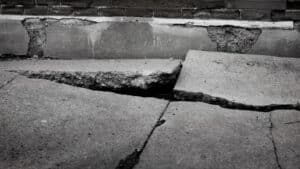Written By Chris Dolan
This week’s question comes from anonymous: My daughter tripped in the high school parking lot she walks through after softball practice. It was already dark and there were no direct lights and she tumbled down a nearby ravine. Luckily, she only had some minor cuts and bruises, but I am worried that another kid will get seriously hurt. My friend got hurt in a shopping center parking lot. He sued and got a settlement. Can this be done if someone is hurt on the school grounds? Is there anything that can be done to fix the lights, or put up a fence?
Thank you for writing about the shared safety concerns of many parents. When a child goes to school there is an expectation that the school will have measures in place to keep all those attending the school safe. When there is a hazard such as the one you describe, it is an excellent idea to notify the school, in writing, of the problem. It may help the school make changes, and even if they don’t, it may help someone seriously injured seek justice. The reasons will become clear below.
You mentioned your friend who was hurt in a private shopping center. This raises an important distinction in the law. There are many differences between suing a governmental entity compared to suing a private, or non-Government defendant. In general, government cases are more involved and require specialized knowledge.
For instance, when suing a state-based governmental entity, such as a school, there is an initial requirement that a Government Claim be filed. That means that to successfully maintain a lawsuit, a person must have first explained the basis of the claim to the entity itself and given them an opportunity to respond. The time limit to file this claim is very short. In most instances the claim must be made within six months. Generally, the claim will be denied, and then there is another 6 months to file a lawsuit. For private entities, for this type of incident, the time to file a lawsuit is generally two years. That two-year statute of limitations is generally extended for a minor until they turn eighteen. Unfortunately, that is not the case when suing a government. The requirement to file a timely Government Tort Claim is not, generally, extended beyond the 6 months.
The actual cause of action, the name of the basis for recovery, in a lawsuit is also different. The cause of action against a government entity is called “Dangerous Condition of Public Property,” where against a private entity, it is called “Premises Liability.” They have very similar elements which much be proven, but there are differences. Both require that the defendant own or control the property in question, and that the defect is a substantial factor in causing the harm. However, among other differences, where a public entity is concerned, it must have had to “know, or should have known” of the danger for a long enough time to have protected against it. Whereas a private business must “be negligent in the use or maintenance of the property.” In many cases, for a private business this can come down to making reasonable inspections to seek the danger and warn against it. This is where your written complaint comes into play. If informed in writing of a defect, a public or private defendant is now on notice of the defect and can make changes, or repairs. If they do not, and someone is hurt, they now “know or should have known” or were negligent in not repairing it.
Perhaps the biggest difference, and the most daunting to those unfamiliar, are the government immunities. Historically, people had no right to sue the government, an ancient concept called Sovereign Immunity. Over time, the government passed laws allowing lawsuits where someone is injured. However, they maintain many “immunities.” Immunities act like a get-out-of-jail-free card. If the government enjoys a particular immunity, they can force a lawsuit to be dismissed- thrown out. There are many, but the most often used is called “design immunity.” Where a government has considered a design, and it was approved at high enough levels, they are immune from lawsuits based on that design. It can be an infuriating impediment unless an attorney can show that it doesn’t apply, no longer applies, or that conditions have changed to the point it is no longer the same design.
As you can see, this is a complex area of law with many hurdles and pitfalls. If you or someone you know is injured, make sure to speak to a knowledgeable attorney, such as The Dolan Law Firm. And write your letter explaining the dangers at your daughter’s school.










